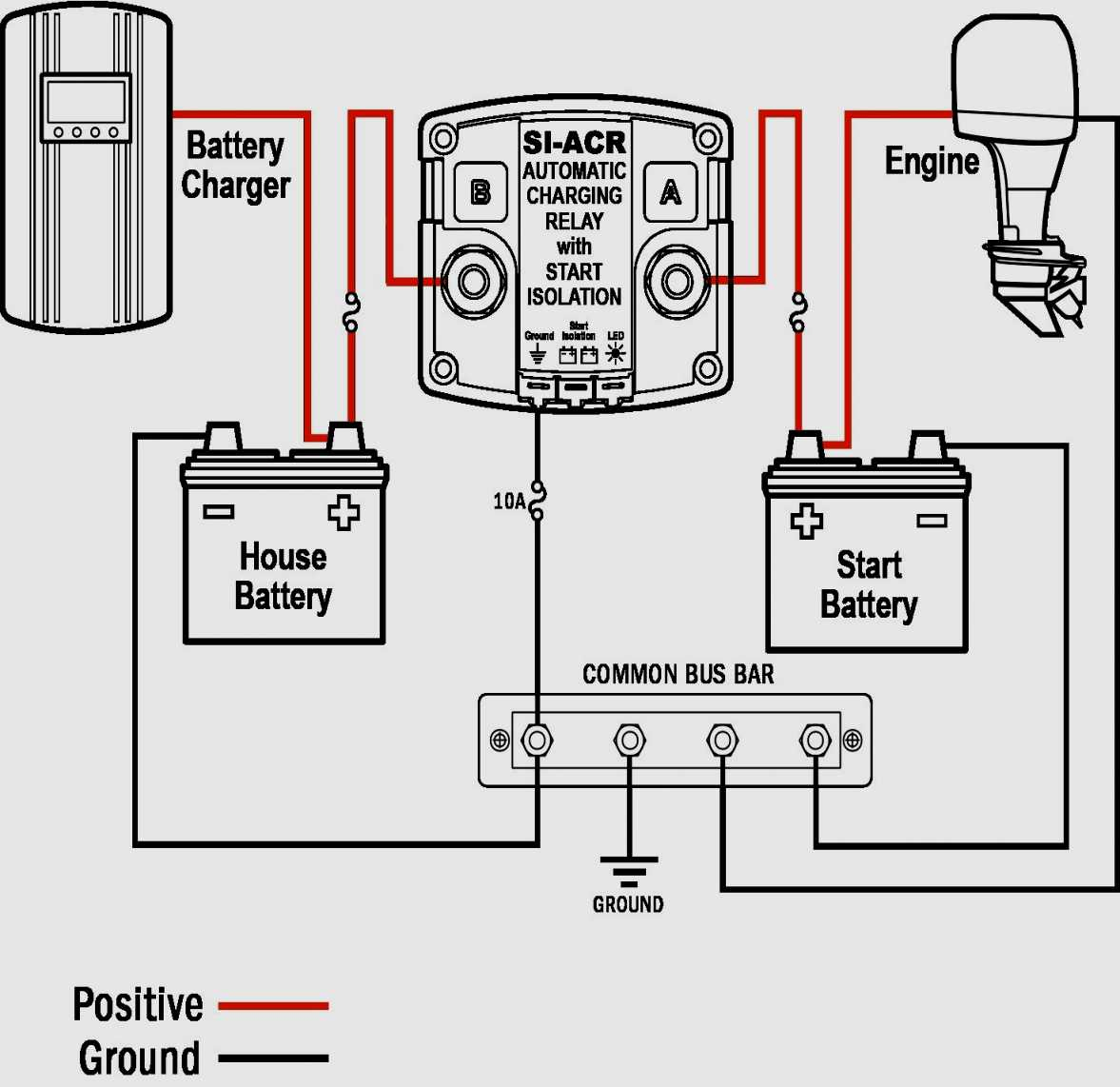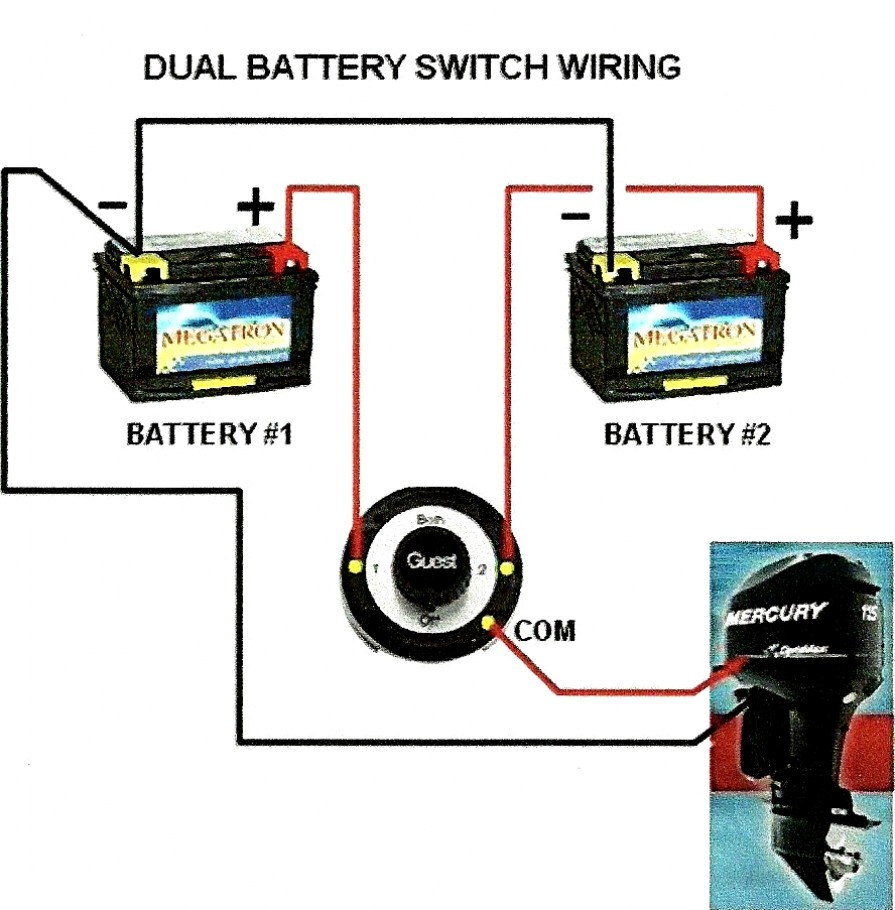Powering Your Adventures: Understanding Marine Battery Setups
Ever dreamt of casting off, leaving the dock behind, and exploring hidden coves? For many boat owners, that dream hinges on a reliable power source. And that’s where understanding your boat's electrical system, specifically the marine battery configuration, becomes crucial. While a single battery might suffice for smaller vessels, many boats, especially those with more demanding electrical needs, benefit from a dual battery system. This article delves into the world of dual marine battery wiring, offering a guide to understanding and implementing this essential system.
Imagine anchoring in a tranquil bay, only to realize your starting battery is drained, leaving you stranded. A dual battery system, when wired correctly, prevents this nightmare scenario. It provides a dedicated battery for starting your engine while reserving a separate "house" battery for powering all other onboard electronics, like lights, navigation equipment, and even the coffee maker. This separation is the core principle behind a dual battery setup.
Historically, boaters relied solely on a single battery for all onboard power needs. As boats became more sophisticated and incorporated more electrical devices, the limitations of this single battery approach became apparent. The need for a reliable starting power source, independent of other electrical demands, led to the adoption of dual battery systems. This evolution reflects the broader trend in boating towards increased comfort and self-sufficiency on the water.
The fundamental principle behind dual marine battery wiring diagrams is the separation of essential engine starting power from the power used for accessories. This separation is achieved using a battery isolator or a battery switch, both of which prevent the house battery from being drained when starting the engine, while still allowing both batteries to be charged by the alternator when the engine is running. Understanding the function of these components is key to grasping how the system works.
A dual battery setup allows you to enjoy all the comforts of home on the water without the constant worry of a dead starting battery. It ensures reliable starting power while providing ample power for all your other onboard electrical needs. Whether it's running the fish finder, powering the cabin lights, or keeping the refrigerator cold, a well-configured dual battery system is essential for a stress-free boating experience.
One of the benefits of a dual marine battery setup is extending the life of your batteries. By dedicating one battery to starting and the other to house loads, each battery experiences less strain and fewer deep discharge cycles, which can significantly prolong their lifespan. For example, running your trolling motor all day won't affect your ability to start the engine at the end of the day.
Another advantage is increased safety and peace of mind. Knowing you have a dedicated starting battery eliminates the anxiety of being stranded due to a drained battery, especially in remote locations. This dedicated starting power source provides a crucial safety net, ensuring you can always get your engine started when needed.
Finally, a dual battery setup allows for greater flexibility and enjoyment on the water. You can freely use your onboard electronics without worrying about depleting your starting battery. This freedom enhances your boating experience, allowing you to fully utilize all the features and comforts your boat has to offer.
Advantages and Disadvantages of Dual Marine Battery Wiring
| Advantages | Disadvantages |
|---|---|
| Reliable starting power | Increased initial cost |
| Extended battery life | More complex installation |
| Enhanced safety and peace of mind | Requires more space and weight |
Best Practice 1: Use marine-grade batteries specifically designed for the harsh marine environment. These batteries are more resistant to vibration and corrosion.
Best Practice 2: Choose the correct size and type of battery isolator or switch based on your boat's electrical system and load requirements.
Best Practice 3: Regularly inspect and clean battery terminals and connections to prevent corrosion and ensure optimal performance.
Best Practice 4: Periodically charge both batteries fully to maintain their health and prolong their lifespan.
Best Practice 5: Consult a qualified marine electrician if you are unsure about any aspect of the installation or wiring.
Frequently Asked Questions:
1. What type of battery is best for marine use? - Marine-grade deep-cycle batteries are recommended for house loads, and marine starting batteries for engine starting.
2. Can I use a car battery in my boat? - While possible in a pinch, car batteries are not designed for the marine environment and are not recommended.
3. What is the difference between a battery isolator and a combiner? - An isolator allows simultaneous charging without connecting the batteries, while a combiner allows manual connection for emergency starting.
4. How do I troubleshoot my dual battery system? - Start by checking the voltage of each battery and then inspect the wiring, connections, and isolator/switch for any issues.
5. How often should I replace my marine batteries? - Marine batteries typically last 3-5 years, depending on usage and maintenance.
6. Can I install a dual battery system myself? - While possible with electrical knowledge, it is recommended to consult a qualified marine electrician for professional installation.
7. What gauge wire should I use for my dual battery setup? - The appropriate wire gauge depends on the amperage of your system. Consult a wiring chart or electrician.
8. How do I maintain my dual battery system? - Keep batteries clean, fully charged, and regularly inspect connections.
Tips and Tricks: Label your batteries clearly as "starting" and "house" to avoid confusion. Consider installing a battery monitor to keep track of battery voltage and state of charge. Carry a portable jump starter as a backup in case of emergencies.
In conclusion, a properly wired dual marine battery setup is essential for any boat owner seeking reliability, safety, and peace of mind on the water. From preventing the dreaded dead-battery scenario to ensuring you have power for all your onboard needs, the benefits of a dual battery system are numerous. While the initial setup may seem slightly complex, understanding the basic principles of dual battery wiring diagrams and following best practices will empower you to confidently enjoy your time on the water, knowing your electrical system is up to the task. Invest the time to learn about and implement a dual battery system – your future boating adventures will thank you. Whether you're a seasoned sailor or a weekend angler, a reliable power source is the key to unlocking unforgettable experiences on the water. So, equip your vessel with a robust dual battery system, and set sail with confidence, knowing you have the power to explore wherever your nautical heart desires.
Aesthetic drawings for boys unleash creativity with coloring pages
Borax and colored clothes decoding the laundry mystery
Llcs in the wild exploring real world examples













